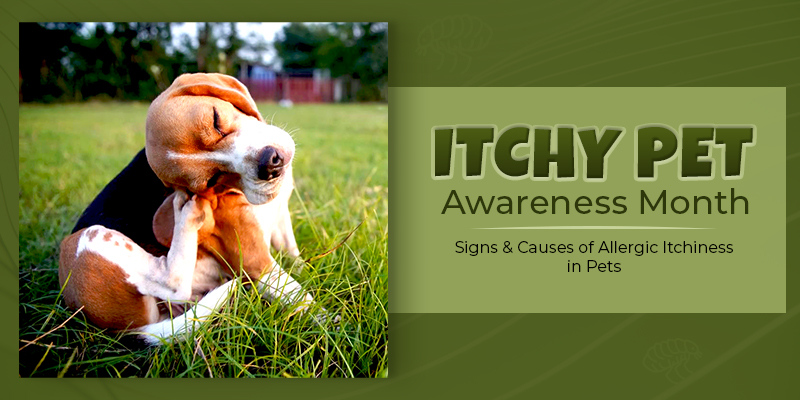
Check out our latest products
Observed as the Itchy Pet Awareness Month, August is that exclusive time of the year to raise awareness about the growing problem of itchiness in pets. According to reports, 30 million households in the US have a dog with itchy skin. Therefore, to honor this month, we’re happy to shed light on the signs of allergic itchiness in pets and the causes behind them. Let’s get started.
Signs of Allergic Itch in Pets
Skin allergies in pets or allergic dermatitis, is a condition Skin allergy (allergic dermatitis) in pets is a condition in which a pet develops an allergic reaction to certain substances in their environment. The allergens generally lead to itchy and irritated skin, causing scratching, biting and licking. Common allergens affecting pets include pollen, dust mites, certain foods, as well as dander, saliva and urine of other animals.
The most common symptoms of allergic itch in pets include:
- Frequent licking
- Chewing
- Biting
- Scratching
- Excessive rolling, rubbing, or scooting
- Body odor
- Hair loss
- Rash and redness
- Greasy skin
- Scabs
Causes of Allergic Itch in Pets
Let’s delve into the common causes of allergic itch in pets:
Environmental Allergens
Environmental allergens like pollen, mold and dust mites are known to commonly cause itchy skin and other allergic reactions in pets, also known as atopic dermatitis. The allergens are often seasonal and lead to excessive scratching, licking and biting around the paws, ears and other areas of the body. Also, know more about Seasonal Allergies in Dogs
Food Allergens
Both dogs as well as cats experience itchy skin caused by food allergens. In dogs, the common allergens include beef, chicken, dairy and eggs. Cats, on the other hand, often get affected by beef, fish and dairy. The allergies are generally caused by the proteins present in the foods.
Flea Allergy Dermatitis
Flea Allergy Dermatitis (FAD) is an allergic reaction in pets caused by flea saliva. The reaction leads to severe itching, skin lesions and inflammation, causing excessive scratching, biting and licking.
Contact Allergies
Contact allergies, also known as contact dermatitis in pets, are caused by direct contact with allergens. Common substances that trigger allergies include chemicals, plants and certain fabrics. Contact allergies lead to symptoms like itching, redness and inflammation.
Other Potential Sources
Apart from the above-mentioned causes, itchy skin in pets can also be caused by treatments, vaccinations, parasite infestations and skin infections (bacterial, yeast and fungal).
Frequently Asked Questions
Q : My pet has itchy skin. Should I consult a vet?
A : If the itching is persistent and/or is accompanied by redness, sores, hair loss or bald spots, you should seek medical advice. Also, if there is odor, discharge or signs of infection, you should get in touch with the vet.
Q : Which skin care products work well to subside itchy skin in pets?
A : The best skin care products to subside itchy skin in pets include:
– HomeoPet Skin & Itch Relief
– Derma Creme for Dogs
– Derma Gel for Dogs
Q : Can allergies cause itchiness in dogs’ anal glands?
A : Yes, allergies can cause irritation in dogs’ anal glands, forcing the canines to lick or scoot their bottom.
Q : What diet is recommended for dogs with itchy skin?
A : The following diets benefit dogs with itchy skin:
– Hypoallergenic or limited ingredient diet
– Foods rich in omega-3 fatty acids (fish oil & flaxseed)
– Novel proteins like duck, venison & kangaroo for managing allergies
– Probiotics for skin/gut health
Bottom Line
While allergies aren’t curable, they can surely be managed with the right approach. Successful management of allergic itch requires the identification of the allergens and avoiding them. With vigilant care and dietary adjustments, you will be able to offer your pal a comfortable and healthy life.
At CanadaVetCare, we carry a wide range of skin-care products for pets at discounted rates. Visit us today to enjoy unbeatable deals on your preferred products from the comfort of your home.

David joined CanadaVetCare in 2013 as a product analyst and veterinary assistant. Being a passionate pet lover and keen animal health researcher, David had always found ways and solutions to help pet parents to improve their pets’ health. He is always happy to answer pet health-related queries and recommending pet parents for the right pet product for their furry companions.







![[5G & 2.4G] 2K Indoor Security Camera for Home Security, AI Voice Change for 2-Way Talk, Motion Detection, Night Vision, 24/7 SD Recording/Cloud Storage, WiFi Home Camera, Pet Cam with Phone App](https://i3.wp.com/m.media-amazon.com/images/I/61I2U+sTT3L._AC_SL1500_.jpg?w=300&resize=300,300&ssl=1)






